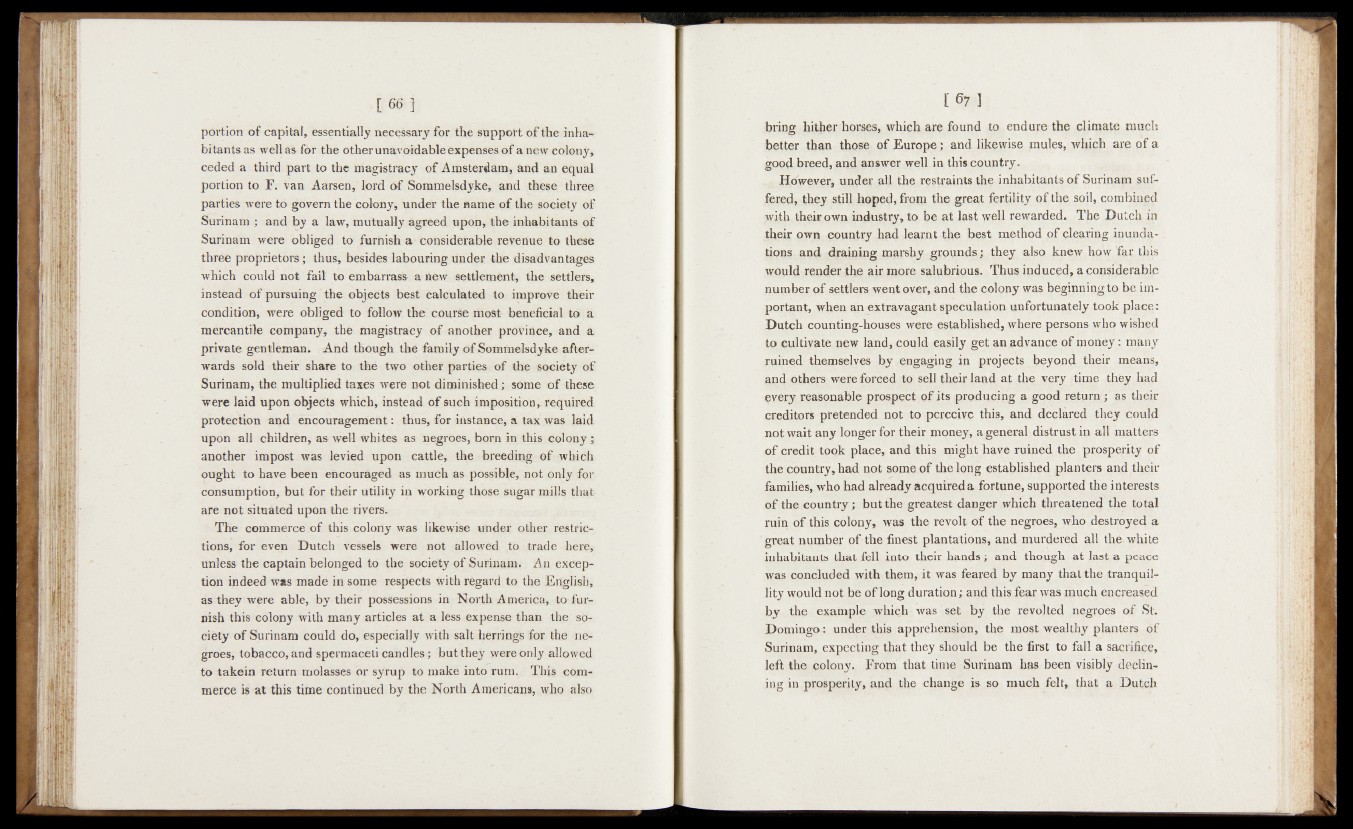
portion of capital* essentially necessary for the support of the inhabitants
as well as for the other unavoidable expenses of a new colony,
ceded a third part to the magistracy of Amsterdam, and an equal
portion to F. Van Aarsen, lord Of Soramelsdyke* and these three
parties were to govern the colony, under the name of the society of
Surinam ; and hy a law, mutually agreed upon, the inhabitants Of
Surinam were obliged to furnish a- considerable revenue to these
three proprietors; thus, besides labouring under the disadvantages
which could hot fail to embarrass a new settlement-, the settlers,
instead of pursuing the objects best calculated to improve their
condition, were obliged to follow the course most beneficial to a
mercantile company* the magistracy of another province, and a
private gentleman. And though the family of Sommeïsdyke afterwards
sold their share to thé two other parties of the society of
Surinam, the multiplied taxes were not diminished ; some of these
were laid upon objects which, instead ofsuchimposition* required
protection and encouragement - thus* for instance* a tax was laid
upon all children, as well whites as negroes, born in this colony;
another impost was levied upon cattle, the breeding of which
ought to have been encouraged as much as possible, not only for
consumption, but for their utility in working those sugar mills that
are not situated upon the rivers.
The commerce .of this colony was likewise under other restrictions,
for even Dutch vessels were not allowed to . trade here,
unless the captain belonged to the society of Surinam. An exception
indeed was made in some respects with regard to the English,
as they were able, by their possessions in North America* to-fur-
nish this colony with many articles at a less expense than the society
of Surinam could do, especially with salt herrings for the negroes,
tobacco, and spermaceti candles; but they were only allowed
to takein return molasses or syrup to make into rum. This commerce
is at this time continued by the North Americans, who also
bring hither horses, wliifji are found to endure-the climate much
better than those of Europe; and likewise mules, which are pf a
good breed, and answer well in this country.
JEJo'weyer, under »If the, restraints the inhabitants of Surinam suffered,
they still hoped, from the great fertility ofthesoil, combined
jwith their own industry, tp be at last well rewarded* The Dutch: in
their own country had learnt the best method pf clearing inundations
and draining marshy grounds ] they also knew how ’far this
would render the air more salubrious. Thus induced, a considerable
number pf settlers went over, and the colony was beginning to be important,
when an extravagant speculation unfortunately took place:
Dutch counting-houses were established, where persons who wished
to cultivate new land, could easily get an advance of money: many
ruined themselves by engaging in projects beyond their means,
and others were forced to sell their land at the very time they had
every reasonable prospect of its producing a good return; as their
creditors pretended not to perceive this, and declared they could
not wait any longer for their money, a general distrust in all matters
of credit toqk place, and this might have ruined the prosperity of
the country, had not some of the long established planters and their
families, who had already acquired a fortune, supported the interests
of the country; but the greatest danger .which threatened the total
ruin of this colony, was the revolt Of the negroes, who destroyed a
great number of-the finest plantations, and murdered all the-white
inhabitants that fell into their hands; and though at last a peace
was concluded with them, it was feared by many that the tranquillity
would not be of long duration; and this fear was much encreased
by the example which was' set by the revolted negroes of St.
Domingo; under this apprehension, the most wealthy planters of
Surinam, expecting that they should be the first to fall a sacrifice,
left the colony, From that time Surinam has been visibly declining
in prosperity, and the change is so much felt, that a Dutch